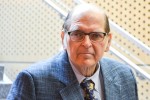Warren Grundfest is remembered for his mentorship and his work in minimally invasive surgery and electrical and biomedical engineering.
Grundfest, a former chair of the Henry Samueli School of Engineering’s biomedical engineering department, died Dec. 28, 2018.
Grundfest first came to UCLA to complete an internship and part of his general surgery residency in 1980, according to a statement from his wife, Andrea Scott. After completing his residency, Grundfest returned to UCLA to become a professor in the department of surgery at the David Geffen School of Medicine in 1985. He became chair of the department of biomedical engineering at the school of engineering in 1999. Grundfest was also a member of the UCLA Brain Research Institute.
Scott said Grundfest’s students adored him. She added she has a 7-inch-tall stack of letters that students sent her and Grundfest before he died. She said they received a similar stack annually around the holidays.
“One of the cards reads: … ‘I wanted to take the time to thank you both for everything you’ve done to help me get where I am today. I truly value the advice and wisdom you both have donned on me over the last three years,’” Scott read. “‘I believe one’s success is the culmination of all past experiences in one’s life, including interactions with others, and I can confidently say I would not be where I am today without you.’”
Vinay Bhupathy, a UCLA alumnus who graduated in 2009, worked in Grundfest’s lab during his time as an undergraduate. He said Grundfest took the time to mentor Bhupathy when he was struggling to decide on his career.
“One time after only knowing me basically for a semester or two, he went out of his way to invite me to his home and introduce me to his wife (Scott) who is an attorney,” Bhupathy said. “They really took the time to mentor me when I was lost as an undergrad.”
He added he remembers Grundfest’s modesty regarding his accomplishments and his willingness to mentor.
“He made tremendous advances in surgery and biomedical engineering and in engineering generally and he was always very humble. That’s something that always stuck with me,” he said. “He always found time to help whoever came to him and whatever they wanted to work on. … And for me personally, he helped guide me in figuring out how I wanted to grow as a person and in my career as a practicing healthcare attorney.”
Bhupathy said he stayed in touch with Grundfest and Scott after graduating.
Maie St. John, chair of the department of head and neck surgery at Ronald Reagan UCLA Medical Center, said Grundfest was years ahead of his time when it came to engineering medical devices. St. John said she first met Grundfest when he worked with her to help determine if she had removed all of the cancer cells from a patient’s tongue during surgery.
“He was a renaissance man in medicine, in surgery and in building innovative, collaborative technologies,” she said.
St. John also said Grundfest helped her establish her career.
“He was an unparalleled mentor,” St. John said. “He was always a person who wanted more for the person in front of him than for himself.”
Throughout his career, Grundfest accumulated two dozen patents and an additional half-dozen provisional patents. He also published dozens of book chapters and authored more than 300 articles in scholarly publications and proceedings.
A memorial fund in Grundfest’s name will be put in place through the American Institute for Medical and Biological Engineering. The fund will award graduate students for excellence in interdisciplinary medical and engineering research.
Scott said that more than his professional accomplishments, Grundfest’s students are his legacy.
“Yes, he left a legacy in minimally invasive surgery and laser applications to medicine, but his real legacy is the students he taught and the lives he was able to change,” Scott said.
Contributing reports from Sameera Pant, Daily Bruin contributor.
